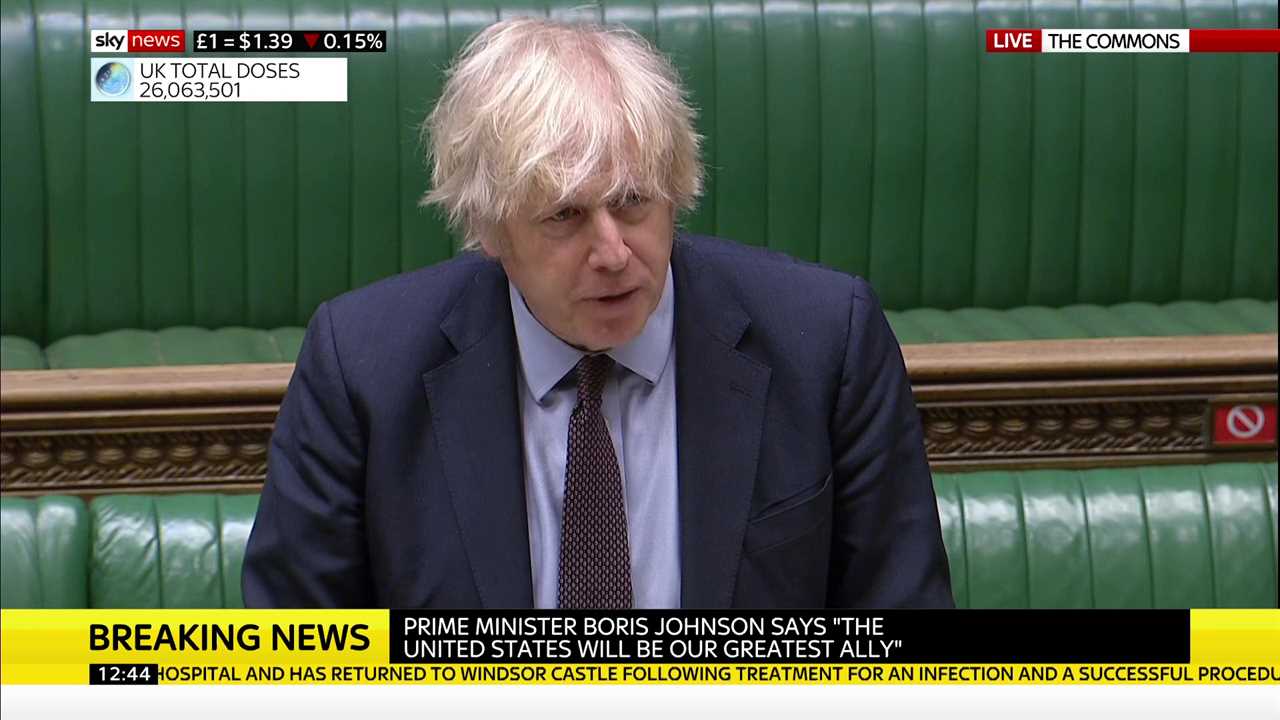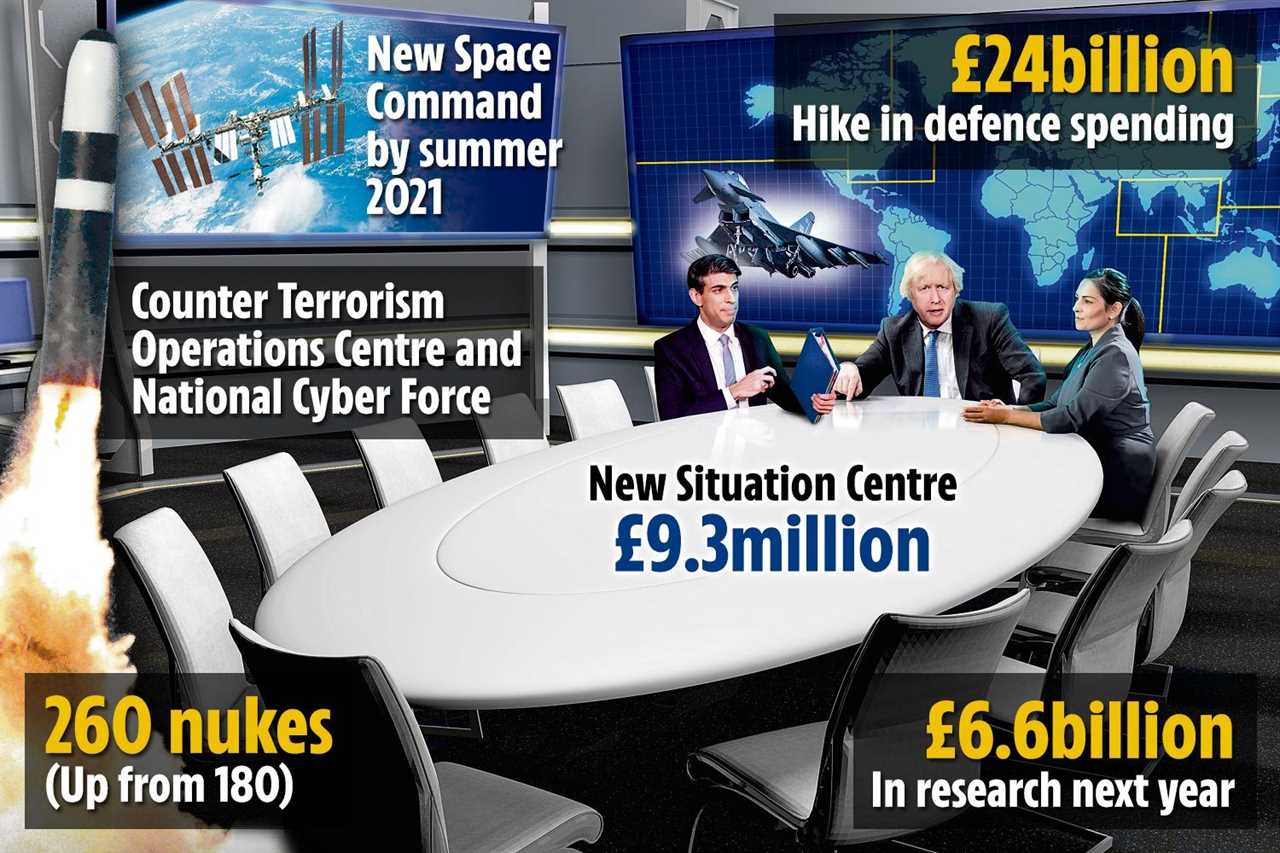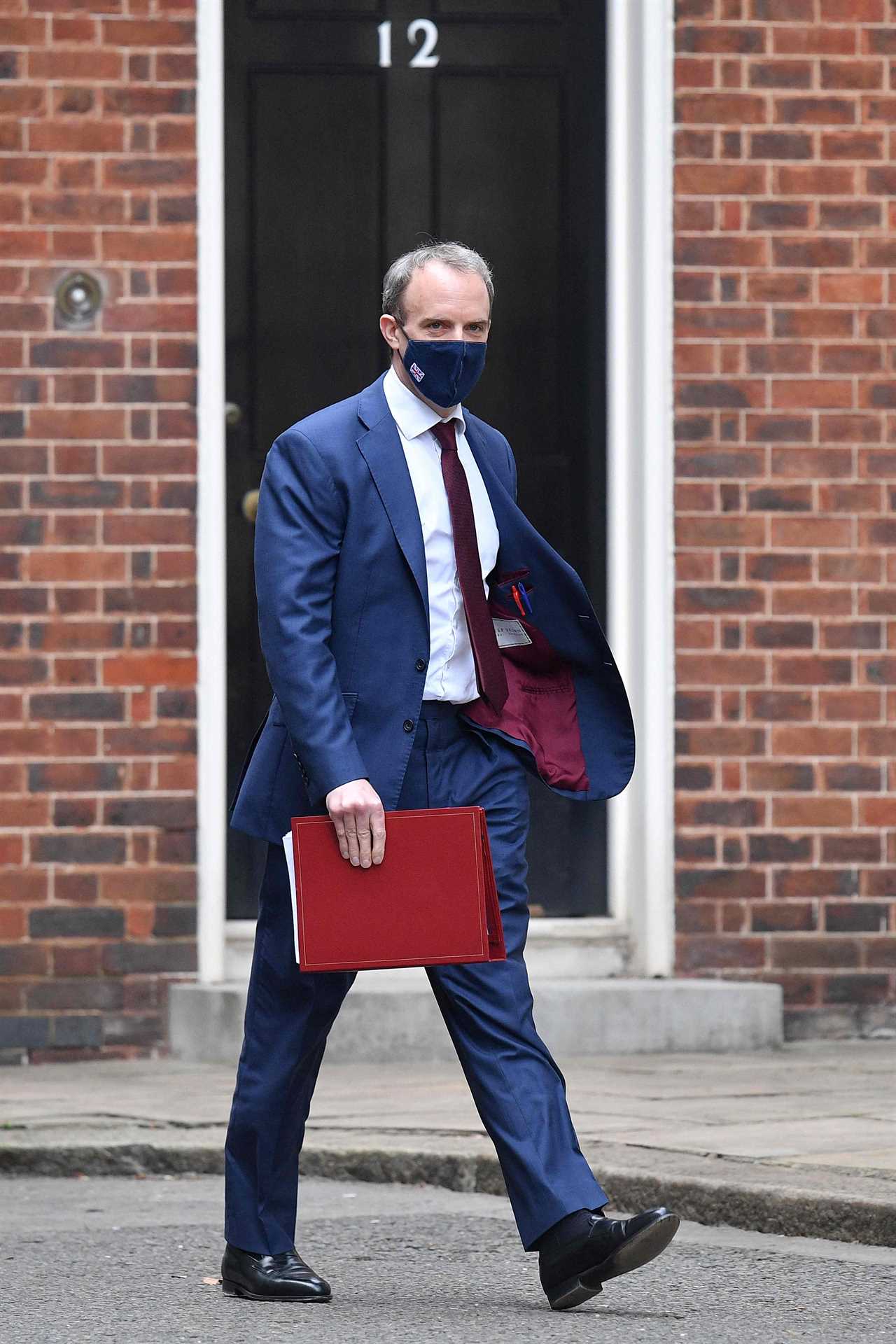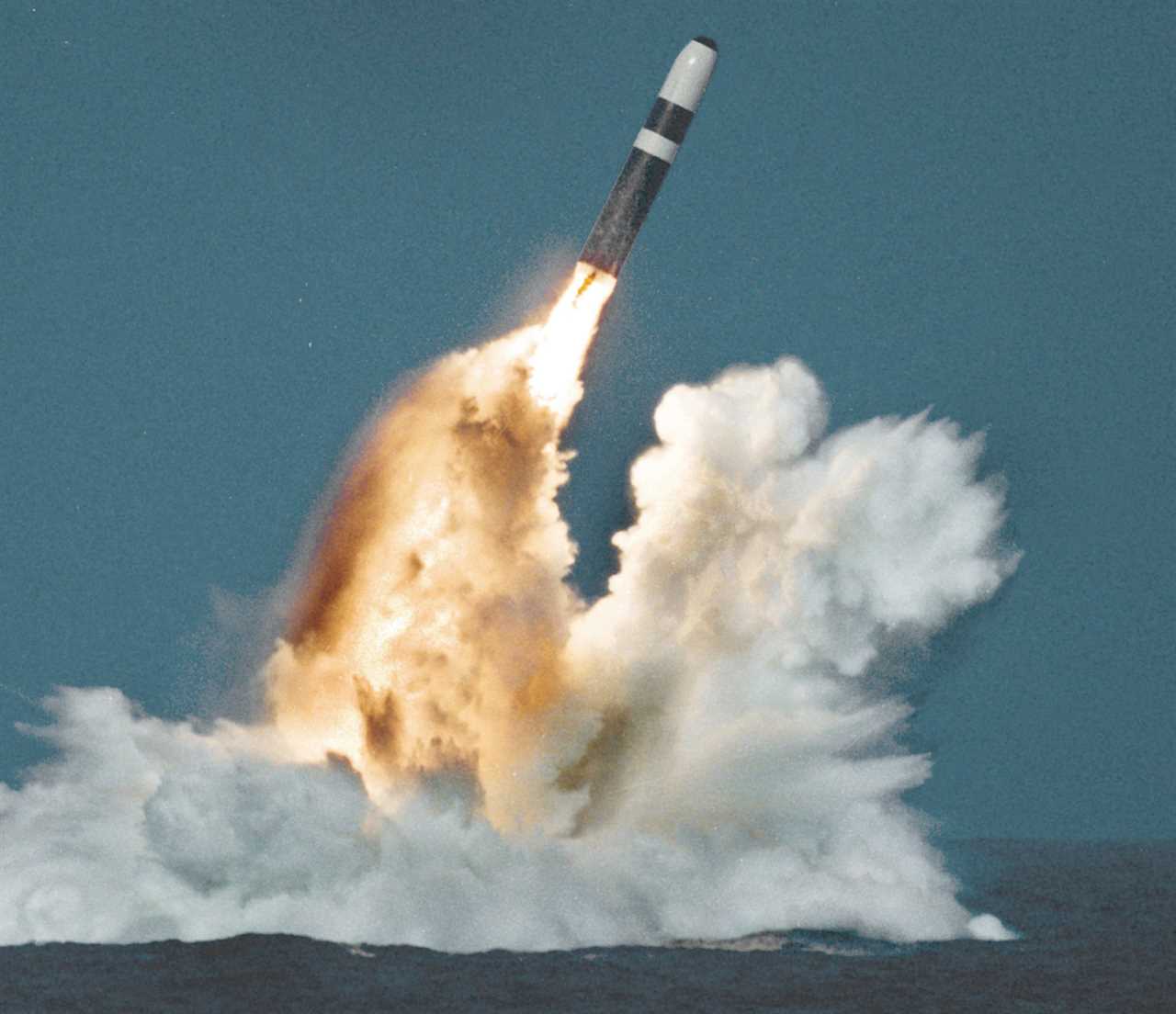BORIS Johnson’s defence review today warned another pandemic is a “realistic possibility” by 2030 as population growth sparks more viruses.
The PM today revealed his biggest shake up since the Cold War to MPs – as he vowed more nukes and billions of pounds of extra cash to keep the nation safe in future.


His major shake-up revealed that infectious disease outbreaks are likely to be more frequent by the end of the decade.
Population growth and the loss of natural habitat would increase interaction between humans and animals, fuelling the risk of a disease spreading from one species to another, like what is thought to have happened with Covid 19.
In his foreword to the Integrated Review of Security, Defence, Development and Foreign Policy, the Prime Minister said when work began on the document in early 2020 “we could not have anticipated how a coronavirus would trigger perhaps the greatest international crisis since the Second World War, with tragic consequences that will persist for years to come”.
He added: “Covid-19 has reminded us that security threats and tests of national resilience can take many forms.”
In a section on global health – listed as one of the “transnational challenges” facing the world – the document said: “Infectious disease outbreaks are likely to be more frequent to 2030.
“Many will be zoonoses – diseases caused by viruses, bacteria or parasites that spread from animals to humans – as population growth drives the intensification of agriculture and as the loss of habitats increases interaction between humans and animals.
“Another novel pandemic remains a realistic possibility.”
The review sets out the need for a fresh national and international plan to deal with a global pandemic.
The report added: “The Government will continue to prepare for and respond to individual risks, whether terrorism, flooding or a new pandemic.
“Learning the lessons of Covid-19, we will also seek to build a better understanding of the UK’s strengths and weaknesses, and improve our national preparedness and readiness across the whole risk lifecycle, from anticipation to recovery.”
Ministers scrambled to get enough access to PPE and ramp up testing in the last year as a result of the pandemic.
But Britain’s fast work on vaccines and scientific research put us ahead of the game when it comes to creating the world-leading jabs programme.
Today’s major defence review includes plans for:
- A huge increase in the number of nuclear weapons
- A proactive push into space and cyber-warfare as well as a massive £24 billion increase in defence spending
- But the RAF is set to lose 24 Typhoons jets, its 13 strong fleet of Hercules transport planes and the Queen’s four remaining VIP jets
- And the army will bear the brunt of cuts too
- The 0.7 per cent aid target will return after being cut this year
- Extra funding for counter terror over fears of dirty bombs
The PM said today he is determined that the UK will continue to be an outward-looking country despite leaving the EU, and will play a key role on the world stage.
And he vowed his new strategy would “make the United Kingdom stronger, safer and more prosperous whilst standing up for our values”.
Britain’s commitment to NATO and the EU was “unconditional and immoveable” and our new strategy will make the UK “match-fit for a more competitive world”, he said.
He told MPs: “Our international policy is a vital instrument for fulfilling this government’s vision of uniting and levelling up across our country, reinforcing the Union, and securing Britain’s place as a science superpower and a hub of innovation and research”.
Boris said it would “bolster our alliances and strengthen our capabilities” and vowed for a new phase in relations with China, demanding the UK “relearn the art of competing against states with opposing values”.
And he vowed to use the COP26 climate conference this year to “rally, as many nations as possible by the target of net zero by 2050.”
Boris promised the US would continue to be the UK’s “greatest ally” going forward.
But MPs lashed out and said it was a missed opportunity to crack down on China.
The PM admitted he had “deep concern” over China’s mass detention of Uighur people in shinjang and the global superpower poses a “great challenge” to the UK, he vowed to work with China and now shut them out in the cold.
He told MPs: “We will work with China, where that is consistent with our values, and interests, including building a stronger and positive economic relationship.”
Those who call for a new Cold War with China “are mistaken”, the PM insisted.
“We have a balance to strike, and will take tough measures to call out China.”
Trending In The News revealed last night the PM will dramatically Britain’s arsenal of nukes in a dangerous post-Covid world – with terrorists poised for a successful nuclear or “dirty bomb” attack within 9 years.
Troops will serve overseas “more often and for longer” as Britain tries to carve out an aggressive role as the world’s policeman in the “new frontiers” of space and cyber-warfare.
Boris also vowed to “defend the integrity of our nation against state threats, whether in the form of illicit finance or coercive economic measures, disinformation, cyber-attacks, electoral interference or even – three years after the Salisbury attack – the use of chemical or other weapons of mass destruction.”
Foreign Secretary Dominic Raab said the report will help create “better-paid jobs of the future” and “answer questions” about what role Britain will take on globally now we’re outside the EU.
MORE NUKES
The nuclear deterrent will be upped from the current stock of not more than 180 warheads to not more than 260, amid fears other countries are “increasing and diversifying their nuclear arsenals.”
Mr Raab today confirmed the move to boost Britain’s nuclear arsenal, insisting “over time as the circumstances change and the threats change, we need to maintain a minimum credible level of deterrent.”
He added: “Why? Because it is the ultimate guarantee, the ultimate insurance policy against the worst threat from hostile states.”
THREATS FROM RUSSIA & IRAN
Mr Johnson’s landmark overhaul of foreign and defence policy warns our way of life is under threat from rogue states, terrorists and even big tech firms – with Brexit giving the newly nimble UK a unique opportunity to become the West’s lynch-pin on the world stage.
But the review is likely to trigger major backlash after arguing Britain must seek closer economic ties with China and butchers Saudi Arabia while further freezing out the Russian menace.
Ahead of the PM’s speech ex MI6 chief Sir Alex Younger warned Russia is “implacably hostile” to the UK and its allied countries, while China represents a “generational threat”.
He said: “There’s no doubt that China represents the generational threat and the reason for that is that the idea that China will become more like us as it gets richer, or as its economy matured, is clearly for the birds.
“That’s not going to happen. On the contrary I expect China’s Communist Party to double down on its ideology in the future.
“There’s going to be an ideological divergence between us in the future, that’s going to generate rivalry and reduce trust.”


DIRTY BOMB THREAT
The review will starkly lays out that “the terrorist threat in the UK remains all too real – whether Islamist-inspired, Northern Ireland-related or driven by other motivations”.
The report warns “it is likely that a terrorist group will launch a successful chemical, biological or nuclear attack by 2030” with a new cross-Whitehall Counter Terrorism Operations Centre set up.
HOME FRONT
Back home a 21st century Dad’s Army style “reservist cadre” will be recruited as a national disaster force, all run from a new high-tech £9.3 million Whitehall “Situation Centre” bunker coordinating spies and drones.
A leaked copy of the 114 page Integrated Review, due to be published on Tuesday afternoon, warns we “must do a better job of putting the interests and values of the British people at the heart of everything we do”.
Amid a crumbling world order it says defending “the status quo” was no longer enough.
And it warns Britain will have to fight harder and more creatively with all of the tools at its disposal, including cyber attacks, diplomacy and trade, to defend its values around the world.
PM will unveil a doom-laden vision of the world by 2030 that shows the threats to democracy heightened by the fall out of the pandemic – with a dramatic increase in new tech and modern warfare needed to keep Britain “match-fit.”.
OUR BOYS OVERSEAS LONGER
Troops will serve overseas “more often and for longer” as Britain tries to carve out an aggressive role as the world’s policeman in the “new frontiers” of space and cyber-warfare.
They will “train, exercise and operate alongside allies and partners across all our priority regions” and “build the capacity of others to deter and defend against state threats and where necessary, assist nations in countering non-state challenges” like terrorists.
PACIFIC FIRST
As Trending In The News revealed two weeks ago, this will come alongside a dramatic increase in trade with Pacific region, focusing first on India where the PM soon.
Military bases will be revamped in Kenya, Oman, Singapore, Cyprus, Gibraltar and Germany so forces can respond more quickly – with a focus on the Indo-Pacific region.
Global Britain’s new priorities will be shown off with a tour of the pacific later this year by the Queen Elizabeth II aircraft carrier.
AID BOOST
International aid will return to 0.7% of UK output after Covid passes, but the report says this should be refocused “more strategically” and include grants to allied developing countries that could “include support to high-quality infrastructure.”
SPACE RACE
In space we will “create shared rules in frontiers such as cyberspace and space” overseen by the nascent Space Command and a new National Cyber Force will us offensive hacking to “detect, disrupt and deter our adversaries”
The PM wants to lead the charge shaping the unstable post-pandemic global order with a proactive push into space and cyber-warfare as well as a massive £24 billion increase in defence spending.
Science and technology will be treated as a matter of National Security, with £6.6 billion to give Britain “an enduring military edge in areas including space, directed energy weapons, and advanced high-speed missiles”.
Mr Johnson says it is “our aim is to have secured our status as a Science and Tech Superpower by 2030.”
KIT UPGRADE
Ambitious plans to modernise the armed forces will see billions of pounds worth of old kit axed, including tanks, planes and warships.
Rivals are using “novel nuclear technologies and developing new ‘warfighting’ nuclear systems” in a bid to “coerce others.”
FORCES CUT
But the RAF is set to lose 24 Typhoons jets, its 13 strong fleet of Hercules transport planes and the Queen’s four remaining VIP jets.
The Navy will lose two specialist sub-hunting frigates, HMS Montrose and HMS Monmouth, as well as its 13 strong fleet of minehunters which are due to be replaced by drones.
The Army is set to bear the brunt of the cuts with commanders braced to lose 10,000 personnel, four infantry battalions, 77 tanks and 760 Warrior fighting vehicles.
And the government will run a series of national level rehearsals to prepare for future crises.
Last night the MoD said the armed forces were changing to meet new threats.
“As threats change our armed forces must change,” a spokesperson said.
“They are being redesigned to confront future threats, not re-fight old wars.”
The Armed Forces will be fully staffed and equipped to confront those threats.”
But Dr Alan Mendoza, executive director of the Henry Jackson Society, said the leaked report “says loud and clear that Global Britain is back.
“It also makes clear we must be aware of the very real threats to our way of life”, he added.
“Out of the EU, we will now be able to take on the global big beasts of China and Russia with a nimbler and better equipped national force.
“260 nuclear warheads sends a message loud and clear to our adversaries that Britain will defend itself by all means necessary.”






